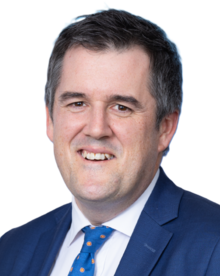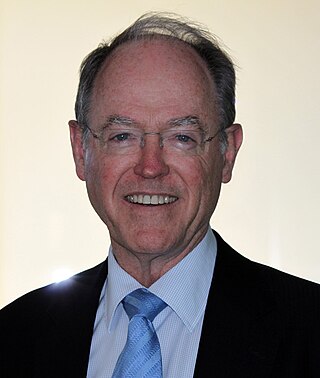
Donald Thomas Brash is a former New Zealand politician who was Leader of the Opposition and leader of the New Zealand National Party from October 2003 to November 2006, and leader of the ACT New Zealand party for seven months from April to November 2011.

Sir Simon William English is a New Zealand former National Party politician who served as the 39th prime minister of New Zealand from 2016 to 2017. He had previously served as the 17th deputy prime minister of New Zealand and minister of finance from 2008 to 2016 under John Key and the Fifth National Government.
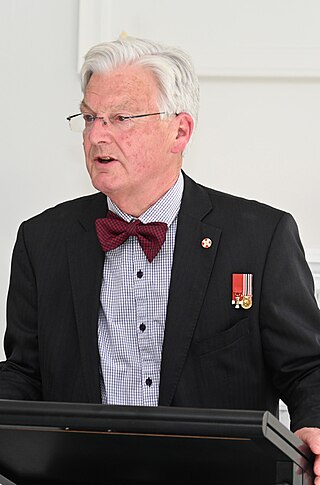
Peter Francis Dunne is a retired New Zealand politician who was the Member of Parliament (MP) for Ōhāriu. He held the seat and its predecessors from 1984 to 2017 – representing the Labour Party in Parliament from 1984 to 1994, and a succession of minor centrist parties from 1994. He was the Leader of Future New Zealand from 1994 to 1995, United New Zealand from 1996 to 2000, and United Future from 2000 to 2017.

The deputy prime minister of Australia is the deputy chief executive and the second highest ranking officer of the Australian Government. The office of deputy prime minister was officially created as a ministerial portfolio in 1968, although the title had been used informally for many years previously. The deputy prime minister is appointed by the governor-general on the advice of the prime minister. When Australia has a Labor government, the deputy leader of the parliamentary party holds the position of deputy prime minister. When Australia has a Coalition government, the Coalition Agreement mandates that all Coalition members support the leader of the Liberal Party becoming prime minister and the leader of the National Party becoming the deputy prime minister.

Dame Annette Faye King is a former New Zealand politician. She served as Deputy Leader of the New Zealand Labour Party and Deputy Leader of the Opposition from 2008 to 2011, and from 2014 until 1 March 2017. She was a Cabinet Minister in the Fourth and Fifth Labour Governments, and was the MP for the Rongotai electorate in Wellington from 1996 to 2017.
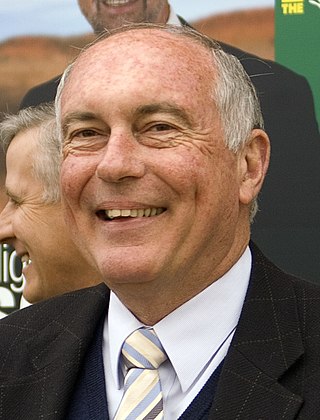
Warren Errol Truss is a former Australian politician who served as the 16th deputy prime minister of Australia and the minister for Infrastructure and Regional Development in the Abbott government and the Turnbull government. Truss served as the federal leader of the National Party of Australia between 2007 and 11 February 2016 when he announced his decision to retire and not contest the 2016 federal election. He was the member of the House of Representatives for Wide Bay from the 1990 election until his retirement in May 2016. Following the merger of the Queensland branches of the Nationals and Liberals, Truss was re-elected in 2010 for the Liberal National Party.

Judith Anne Collins is a New Zealand politician who has served as the attorney-general and minister of defence since 27 November 2023. She previously served as the leader of the Opposition and leader of the New Zealand National Party from 14 July 2020 to 25 November 2021. Collins has served as the Member of Parliament (MP) for Papakura since 2008 and was MP for Clevedon from 2002 to 2008.

Sir John Phillip Key is a New Zealand retired politician who served as the 38th prime minister of New Zealand from 2008 to 2016 and as leader of the New Zealand National Party from 2006 to 2016.

Murray Stuart McCully is a former New Zealand politician. He is a member of the National Party, and served as Minister of Foreign Affairs from 2008 to 2017.

Maurice Donald Williamson is a New Zealand politician and former diplomat.
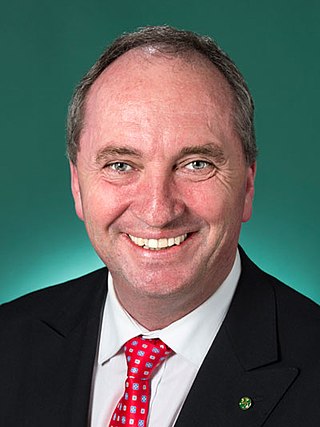
Barnaby Thomas Gerard Joyce is an Australian politician who was the leader of the National Party of Australia from 2016 to 2018 and again from 2021 to 2022. Joyce was the 17th deputy prime minister of Australia during both his leadership tenures under Prime Minister Malcolm Turnbull from 2016 to 2018 and Prime Minister Scott Morrison from 2021 to 2022.

Paula Lee Bennett is a New Zealand former politician who served as the 18th deputy prime minister of New Zealand between December 2016 and October 2017. She served as the deputy leader of the National Party from 2016 to 2020 and as MP for Upper Harbour from 2014 to 2020.

Catherine Joan Wilkinson is a New Zealand farmer and politician. She was a member of the New Zealand House of Representatives for the National Party from 2005 until her retirement in 2014. From 2008 until January 2013, she was a member of cabinet, holding the portfolios of Labour, Conservation, Food Safety, and Associate Immigration, before being removed from cabinet by Prime Minister John Key.
Katrina May Shanks is a New Zealand chief executive and former politician.
Opinion polling has been commissioned throughout the duration of the 48th New Zealand Parliament and in the leadup to the 2008 election by various organisations, the main four being Television New Zealand, TV3, The New Zealand Herald and Roy Morgan Research. The sample size, margin of error and confidence interval of each poll varies by organisation and date.

Steven Leonard Joyce is a New Zealand former politician, who entered the New Zealand House of Representatives in 2008 as a member of the New Zealand National Party. As a broadcasting entrepreneur with RadioWorks, he was a millionaire before he entered politics. In 2008 he became Minister of Transport and Minister for Communications and Information Technology. He later became Minister of Science and Innovation, and then served as Minister of Finance and Minister for Infrastructure.

John Spencer Boscawen is a former New Zealand politician. He is a member of the ACT New Zealand Party and served as a member of the New Zealand House of Representatives from 2008 to 2011.
The Rees ministry was the 91st ministry of the Government of New South Wales, and was led by the 41st Premier Nathan Rees.

Paul Jonathan Goldsmith is a New Zealand historian and politician. The biographer of several leading right-wing political and business figures, he was first elected a list member of the New Zealand House of Representatives for the National Party at the 2011 election.
The 2011 New Zealand Labour Party leadership election was held on 13 December 2011 to choose the thirteenth Leader of the New Zealand Labour Party. A Deputy Leader and a senior and a junior whip were also elected. Following the Labour Party's loss in the 2011 general election, leader Phil Goff and deputy leader Annette King resigned, prompting the leadership election, which was conducted as a secret ballot of the Labour caucus.


